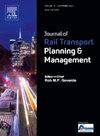Enhancing railway corridor governance: Cooperative game model
IF 2.7
Q3 TRANSPORTATION
Journal of Rail Transport Planning & Management
Pub Date : 2025-09-20
DOI:10.1016/j.jrtpm.2025.100549
引用次数: 0
Abstract
Despite the EU's efforts to enhance the competitiveness of rail freight transport, the lack of coordination and cooperation among governments and infrastructure managers remains a significant barrier. Rail freight corridors, serving as critical arteries for transnational trade and economic integration, are particularly vital for strengthening rail's competitive position in European transport market. This paper proposes the application of cooperative game theory to address the coordination challenges among stakeholders within rail freight corridors. A cooperative game model is developed to evaluate the potential for improving corridor governance through the formation of coalitions among the involved countries. In addition to the Shapley value we introduce two novel allocation rules, termed the proportional rule and the adjusted proportional rule, which are specifically designed to address the railway freight corridor problem by linking allocation of coalition worth to countries' contributions to improving corridor competitiveness. The results of the model suggest that forming coalitions around shared objectives within the cooperative game framework significantly increases the revenues of infrastructure managers and ensures a fairer distribution of the coalition's worth among the participating countries.
加强铁路走廊治理:合作博弈模型
尽管欧盟努力提高铁路货运的竞争力,但政府和基础设施管理者之间缺乏协调与合作仍然是一个重大障碍。铁路货运走廊作为跨国贸易和经济一体化的关键动脉,对加强铁路在欧洲运输市场的竞争地位尤其重要。本文提出运用合作博弈论来解决铁路货运走廊内利益相关者之间的协调问题。开发了一个合作博弈模型,以评估通过在相关国家之间形成联盟来改善走廊治理的潜力。除了Shapley值之外,我们还引入了两个新的分配规则,称为比例规则和调整比例规则,它们通过将联盟价值的分配与各国对提高走廊竞争力的贡献联系起来,专门用于解决铁路货运走廊问题。该模型的结果表明,在合作博弈框架内围绕共同目标组建联盟,可以显著增加基础设施管理者的收入,并确保联盟的价值在参与国之间得到更公平的分配。
本文章由计算机程序翻译,如有差异,请以英文原文为准。
求助全文
约1分钟内获得全文
求助全文
来源期刊

Journal of Rail Transport Planning & Management
TRANSPORTATION-
CiteScore
7.10
自引率
8.10%
发文量
41
 求助内容:
求助内容: 应助结果提醒方式:
应助结果提醒方式:


